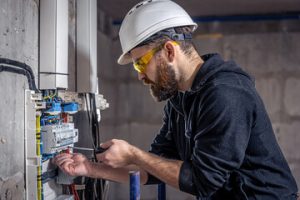Commercial Electrical Service providers respond to a wide range of problems that could disrupt business operations. They troubleshoot issues and implement lasting solutions to ensure that essential equipment functions efficiently.

They also inspect circuit breakers and electrical panels to determine whether they are functioning properly. Often, these systems require upgrades or repairs to meet increasing power demands and comply with regulations.
Providing electricity to commercial buildings requires complex wiring and systems. Commercial electricians can offer installation services that ensure your electrical system is sized appropriately, meets local codes and safety regulations, and improves energy efficiency. These services can include breaker panel upgrades, lighting installations, power line extensions and more.
In addition to installing new wiring and equipment, commercial electrical services can also upgrade old or outdated wiring. Old wiring can pose a serious safety hazard for employees and customers. It may also cause power outages or interfere with your equipment. If you have noticed frequent power outages or inconsistent voltage, a professional can inspect your building’s electrical system to determine the root cause of the issue. They can then recommend solutions, such as upgrading your breaker panels or installing voltage regulators, to stabilize your building’s power supply.
Commercial electrical services can provide a variety of other maintenance and inspection services for multi-unit apartment buildings. These services are designed to improve tenant comfort, safety, and energy efficiency while minimizing costs for property managers. They can include electrical panel upgrades, new lighting installations, wiring for Internet and cable TV, and safety inspections and code compliance checks.
Electricians can also help you lower your energy costs by installing lighting controls and energy management software. These tools can help you track your energy use and make data-driven decisions on where to cut costs. In addition, they can install meters and analyze your power quality to pinpoint issues like spikes or drops in energy efficiency.
Regular electrical service and maintenance can reduce the risk of fires and other electrical accidents. It can also help your business stay competitive by reducing electricity bills and maintaining equipment performance.
The professional technicians at your local commercial electrical service provider are licensed, experienced professionals with extensive training in the safe handling of electrical systems. They follow specific requirements and guidelines to minimize the risk of accidents or injuries to occupants, as well as damage to property. They understand the ins and outs of NEC articles, conductors, and general requirements to avoid common mistakes and issues that can lead to dangerous problems.
Maintenance
In many businesses, even a short period without electricity can be devastating. That’s why it is important to have a reliable team on hand to quickly and skillfully diagnose problems and perform necessary repairs. The best way to prevent issues is through a comprehensive maintenance program that includes routine inspections and proactive repair services. This approach ensures that your electrical systems and equipment will always work as they should, saving you money on costly repairs and downtime.
Commercial electrical service providers offer a wide range of maintenance services, including electric panel and circuit breaker installation, power quality evaluations, lighting upgrades, structured cabling, and backup generator installations. These solutions are tailored to the unique needs of commercial properties and ensure that your property functions smoothly and adheres to all safety standards.
Signs that your electrical system is in need of professional attention include humming or buzzing sounds, flickering lights, or a break in continuity. These are all signs of dangerous and potentially damaging problems with your wiring or electrical panels, which can be easily corrected by a licensed electrician. If left unchecked, these problems can lead to fires and other serious hazards.
One of the most common problems with commercial electrical systems is faulty or old wiring. This can often be detected during a routine inspection and quickly repaired by an experienced electrician. Regular maintenance checks can also help you identify potential issues before they become serious problems, preventing them from escalating and disrupting your business operations.
As businesses grow and change, their electrical needs can evolve as well. Upgrading electrical service can be a simple way to increase your capacity for equipment, machinery, or even add new locations. Professional electricians can help you choose the right solution for your needs and install it properly, ensuring that your electrical system is ready to accommodate future growth and technological changes.
With PowerForce by Qmerit, you can have access to a nationwide network of vetted contractors that are qualified for any job, big or small. This new solution to traditional commercial electrical services streamlines contractor management and eliminates the need for juggling multiple contractors across the country. Simply place a work order and our experts will match you with an electrician based on your service scope, location requirements, and skill set.
Upgrades
Commercial properties require more maintenance and upgrades than residential systems to support growing power demands, meet compliance standards and reduce operational disruptions. From lighting solutions to electrical panel upgrades and renewable energy integration, commercial services can help property owners unlock the full potential of their space and ensure long-term reliability.
Upgrading your electrical system is a multi-step process that requires the coordination of a licensed electrician and local authorities to obtain permits. A certified professional will inspect your current panel and wiring to determine if there’s enough capacity to handle your load, and will consult with you to identify your specific energy needs.
A commercial electrician can install a new electrical panel to increase the amount of electricity your building can use without risking overloads or outages. This is especially important if you’re experiencing frequent circuit breaker trips or are planning on adding large appliances or electric vehicle chargers.
An upgraded electrical system can also improve energy efficiency by incorporating new lighting technology and smart systems that track and control usage, decreasing overall utility costs and reducing environmental impact. In addition, a commercial service can install voltage regulators to stabilize the power supply and prevent costly outages and equipment damage.
Outdated electrical systems can pose a safety hazard to employees and customers and are more likely to experience fire hazards or shock incidents. A professional electrician can identify and correct issues with faulty outlets, poor grounding, and other problems that could lead to an emergency situation.
Investing in an upgraded electrical system can make your building more attractive to potential buyers or tenants in the future and protect you from costly electrical failures that may result in business downtime and lost productivity. A qualified commercial electrician can recommend and implement changes to your system that will boost safety, functionality and value for years to come.
Inspections
If you are a property owner, hiring a professional commercial electrician to inspect and maintain your electrical system is crucial. These inspections prevent safety hazards, help you meet compliance standards, and save you money on costly repairs.
Whether you have an existing commercial property or are building a new one, regular inspections keep your property safe and efficient. These inspections include a visual examination of your circuit breakers, panels, wiring, and more to identify any signs of wear, tear, or corrosion. They also check that the connections to outlets, light fixtures and appliances are secure and up to code.
When you hire a commercial electrical service, they will also inspect the electrical system during construction to ensure it meets professional codes before your building opens. These inspections are known as rough and final. Rough inspections occur before any concealment of the work takes place, and a final inspection occurs when the construction is complete but before the utility is allowed to energize it.
In addition to these inspections, commercial electrical services will verify that the correct equipment is used for your power needs, as well as perform testing to determine if any systems are operating properly. This includes checking that the electrical service is up to the building’s power demands, that the load is balanced evenly, and that the correct amperage ratings are used for each circuit.
Your electrical inspector will also examine equipment like transformers and meter cabinets on multi-building properties. Often these are building-side transformers that may step down or step up the voltage to serve specific areas of the property. Reading equipment labels and ensuring adequate working space are common tasks during this portion of the inspection, and the inspector should always be sure to use non-contact or limited-contact voltage detectors to verify that all components are not energized.
Once your commercial property passes its final inspection, it is important to continue with annual inspections to ensure your building continues to operate safely. If you notice any problems, your commercial electrician can help with repair services and upgrades that will improve energy efficiency, protect the environment, and reduce long-term damage.
